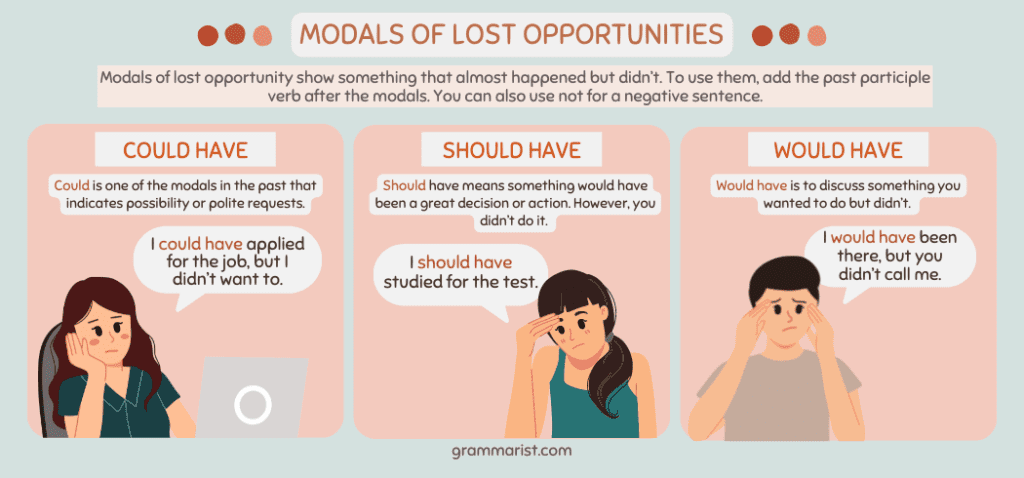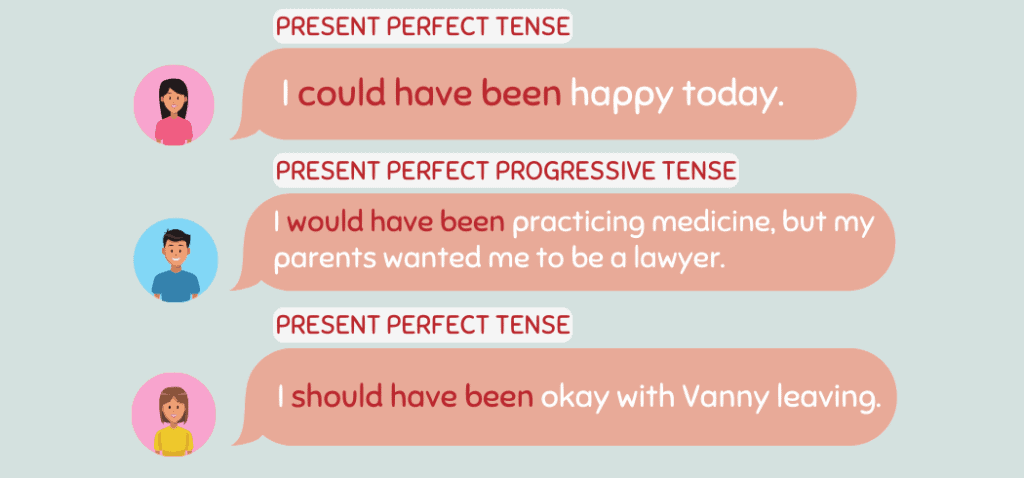Ever heard of the phrase, “shoulda, woulda, coulda?”. Many modal verbs express actions and situations that didn’t really happen in the past. They include would have, could have, and should have.
It’s okay if you get confused about the uses of these three modals. I know a few people who sometimes struggle with it. I’ll show you the differences between could have, should have, and would have with sentence examples. Once you understand the lesson, test your knowledge by answering the worksheet I provided.
What are the Modals of Lost Opportunities?

Modals of lost opportunity show something that almost happened but didn’t. They include could have, would have, and should have.
To use them, add the past participle verb after the modals. You can also use not for a negative sentence.
Could Have
Could is one of the modals in the past that indicates possibility or polite requests. But when used with another auxiliary verb have, it expresses something possible in the past but did not happen. For example:
- I could have applied for the job, but I didn’t want to.
This sentence shows that it was possible for the speaker to apply for the job. However, it did not happen because they didn’t want to. Simple, right?
Here are more examples of could have and couldn’t have used in sentences.
- You could have stayed up late. But your mother asked you to go to bed.
- I couldn’t have entered the room earlier. Mika was still inside.
Should Have
Should have means something would have been a great decision or action. However, you didn’t do it. It’s similar to offering suggestions in the past or regretting past actions. For example:
- I should have studied for the test.
This sentence might mean that the speaker didn’t study hard for the test and therefore failed the exam.
Here are more examples of should have sentences.
- You should have stayed at home.
- Maybe Julia shouldn’t have eaten so much cake.
You can also use should have with the past participle form of the verb when talking about something that, if everything went as planned or if everything is normal, has already happened.
But because we’re unsure that everything is normal, we say should have. For example:
- My parents should have arrived by now.
This sentence implies that the speaker’s parents have arrived if everything is fine.
Below are more examples.
- Christopher should have finished the job by now.
- Anne should have stayed, but she hasn’t.
Would Have
Sentences with would have are part of the third conditional. This is used to express the past consequence of an impossible situation in the past. For example:
- If I had enough wealth, I would have bought a new car.
This means that the speaker didn’t buy a car because it’s impossible for them to have enough wealth.
Another use of would have is to discuss something you wanted to do but didn’t. It’s like the third conditional without the if clause.
Here’s a would have sentence example.
- I would have done the article, but I was busy.
This sentence means that the speaker wanted to do the article, but they were busy.
Take a look at these other examples.
- Jamie would have called Kyla, but he didn’t know her number.
- I would have been there, but you didn’t call me.
- I would have gone to the birthday party, but my daughter got sick.
Contractions
You can contract should have to should’ve, could have to could’ve, and would have to would’ve in informal situations. That’s why the slang terms coulda, shoulda, and woulda are also prevalent. But it’s never correct to say could of, should of, and would of.
Could Have Been vs. Would Have Been vs. Should Have Been

Have been is a verb construction used in the present perfect or present perfect progressive tense to show actions or conditions that started in the past and continued in the present.
Below are examples of could have been in the present perfect and present perfect progressive tenses.
- I could have been happy today. (Present perfect tense)
- I could have been working in the company, but I decided not to. (Present perfect progressive tense)
Here are some examples of would have been in the present perfect and present perfect progressive tenses.
- I would have been a doctor, but my parents wanted me to be a lawyer. (Present perfect tense)
- I would have been practicing medicine, but my parents wanted me to be a lawyer. (Present perfect progressive tense)
Take a look at these examples of should have been in the present perfect and present perfect progressive tenses.
- I should have been okay with Vanny leaving. (Present perfect tense)
- I should have been applying for a job at that time. (Present perfect progressive tense)
Summarizing Could Have, Should Have, and Would Have
I hope my handy guide helped you articulate your present feelings about past decisions. Whether it’s could have, should have, or would have, you already know how to express yourself in a grammatically correct manner.
Remember that you can use could have for something possible in the past that did not happen, while should have shows something we wish had happened. Use would have when writing third conditional sentences.